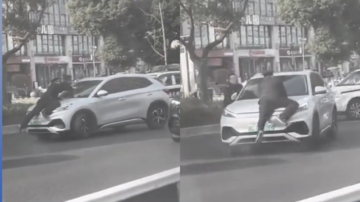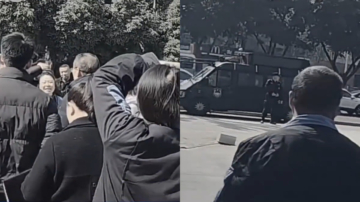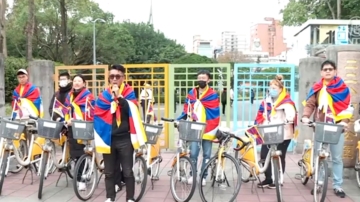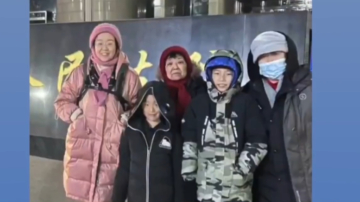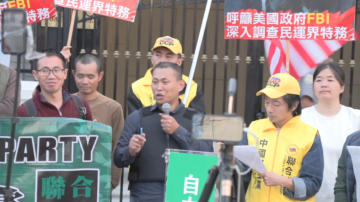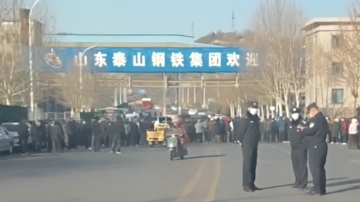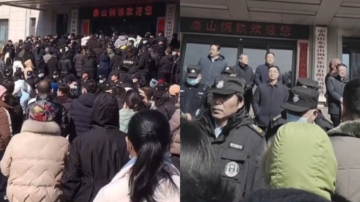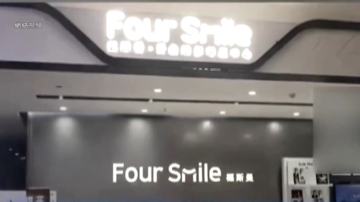【新唐人2014年01月27日讯】美国人权组织“自由之家”发布《2013年度世界自由度调查》,结果显示,中国如同往年一样,再次与越南、柬埔寨、朝鲜等国一同被评为“不自由”国家。报告特别指出,去年中国加紧压制异议人士,自由度不进反退,因此成为亚洲表现最差的国家之一。
据“英国广播公司《BBC》”报导,1月23号,总部设在华盛顿的美国独立调查机构“自由之家”,公布了2013年全球各国“政治权利”和“公民自由状况”的评比调查结果。结果显示,中亚和中东地区加紧压制民主,导致2013年全球自由指数连续第8年下降。
这是《自由之家》第41期世界自由年度报告。是按照满分1分,最差7分的标准进行评估。中国在“政治权利”一项得分为最低分7分,“公民自由”一项的评分为6,整体自由程度为6.5,与越南、寮国、柬埔寨、缅甸和朝鲜一同被评为“不自由国家”。菲律宾、泰国和马来西亚则评为“部分自由国家”。而台湾、南韩、日本、印尼和澳洲都被列为“自由国家”。
原美国哥伦比亚大学人权研究所访问学者古川:“这个‘政治自由’当然肯定是最低的,因为柬埔寨它们国会还有选举,像中国的话,中国的全国人大就不是选举,它就是一个任命的。而且它的公民权利,这方面更不用说了,就连它在《宪法》上规定的公民权利,它都不去落实,集会自由啊、言论自由啊,这些都得不到保护。政治权利和公民自由方面都是倒退的。”
据《美国之音》报导,“自由之家”的报告特别指出,2013年,亚太地区的中国,加紧压制异议人士,自由度不进反退。报告批评了中共当局口头高喊“反腐败”、和“健全法制”,实际却进行打击“新公民运动”,还推出了恶法,扩大网络言论定罪范围。
北京社会活动家胡佳:“我觉得新公民运动的群体,其实就是一个代表公民走上街头,表达诉求,以及公民明确的提出最至关重要的反腐方面的,合理、合法的一个公民行动。现在当局对他们的打压,是共产党的一种报复,是它在滥用法律,其实某种程度上就是在强奸法律,毫无公正可言。反腐败的起点就是财产公示嘛,这么简单的事情,它们居然一直都做不到。”
报告还说,原本被看作是“积极的改革”也被证明是换汤不换药。例如中国当局虽然取消了臭名昭着劳改制度,可是,却对维权、反腐、上访和宗教活动人士,增加了刑事罪名和刑期,或者进行非法拘禁。另外,虽然当局宣布允许部分家庭生第二胎,可是侵犯人权的计生法规和强制堕胎绝育的做法仍然存在。
古川:“实际上严格说来,中共是不可能有改革的,因为它改革意味着要把自己的权力交出去,它肯定是不愿意的。中共这样的政权就希望一直维持它的权利。它那些(改革)当然是压力下,所谓表面上的一种改变。”
原美国“哥伦比亚大学”人权研究所访问学者古川还指出,中共当局出台所谓“双独家庭生二胎”政策,也是因为原本的“一胎化政策”导致了中国老龄化危机。而中共利益集团很大一部分,是通过掠夺廉价劳动力,来维持目前的经济增长,如果青壮年人口持续减少,大量血汗工厂将难以维系。
此外,“自由之家”报告还认为,中国也出现“可喜的亮点”,那就是,越来越多的公民和异议人士开始维护自身权益,向司法制度发出挑战,并取得了一定点胜利,促使少数被拘留的无辜人士重获自由。但维权人士指出,这只能说明中共当局对人权的打压在不断升级,所以才会逼迫更多的民众站出来反抗。
采访编辑/张天宇 后制/王明宇
China Again Categorized As A “NOT FREE” Country
Recently, the U.S.-based human rights organization “Free House” published its report “2013 Freedom in the World”. The investigation results show that along with Vietnam, Laos, Cambodia, Burma and North Korea, China has been categorized as a “Not Free” country. The report stated that China became increasingly intolerant of dissent in 2013. The status of freedom in China is not improving but worsening. China is one of the countries in Asia that has least freedom.
“Freedom House” is a U.S.-based non-governmental organization headquartered in Washington, D.C. It conducts research and advocacy on democracy, political freedom, and human rights. As reported by the BBC, “Free House” published its annual investigation report about the global condition of “political rights” and “civil liberties”. The report shows that Central Asia and Middle East countries continue to suppress democracy, which has caused the status of global freedom to decline for the eighth consecutive year in 2013.
Here are the findings of the 41st edition of Freedom in the World: Each country and territory is assigned two numerical ratings —from 1 to 7—for political rights and civil liberties. 1 represents the most free and 7 the least free. China received 7 for “political rights” and 6 for “civil liberties”, and its overall freedom status is 6.5. Along with Vietnam, Laos, Cambodia, Burma and North Korea, China has been categorized as a “Not Free” country. Philippines, Thailand and Malaysia have been categorized as “Partly Free” countries. While Taiwan, South Korea, Japan, Indonesia and Australia have been categorized as “Free” countries.
Gu Chuan, former visiting Scholar of the University of Columbia, “‘political rights’ in China must rank the lowest. At least in Cambodia, people can vote for the Congress. However, in China, the national Congress representatives are not voted but nominated. As for ‘civil liberties’, ‘freedom of assembly’ and ‘freedom of speech’ that are listed in the Constitution: they still aren't implemented. Both political rights and civil liberties keep retreating in China. ”
As reported by the BBC, the “Freedom House” report particularly pointed out that “China became increasingly intolerant of dissent in 2013.” “Despite official rhetoric about ‘fighting corruption’ and ‘improving the rule of law’, the authorities responded with campaigns to intensify ideological controls. New judicial guidelines expanded the criminalization of online speech, confessions and ‘self-criticisms’”
Hu Jia, social activist in Beijing, “I think the “’New Citizen Movement’ is just about a citizen walking the street and expressing his aims like “anti-corruption”. It’s a movement both reasonable and legal. Now the party has cracked down on them, which is an abuse of law. To a certain extent, the party is ‘raping’ the law and it cannot be justified at all. The first step to anti-corruption is to publicize officials’ properties. It’s such a simple thing but the party is just not able to do it. ”
The “Freedom House” report also says that “even potentially positive changes fell short” in China. “Although authorities began to close the country’s infamous ‘reeducation through labor’ camps, they increasingly turned to criminal charges with potentially longer sentences and various alternative forms of administrative or extralegal detention to punish human rights defenders, anti-corruption activists, petitioners, and religious believers. And despite announced reforms that will increase the number of two children families, the intrusive regulations and harsh practices used to enforce the country’s long-standing birth quotas remain in place.”
Gu Chuan: “Strictly speaking, there is no hope that the party would reform in any way. If it ever reforms, it would have to hand over its power. The party is absolutely not willing to do it. The party wishes to maintain its power forever. The so-called reform is nothing but some minor changes the party has made under pressure.”
Now the party allows parents who are both single children of their families to have a second kid. Gu Chuan pointed out that the party loosens the birth policy only to relieve the crisis of population aging in China caused by its “one-child policy”. The group interest in China is to maintain economic growth by exploiting the cheap labor force. If the population in China keeps aging, it’ll be hard for them to continue exploiting cheap labor.
In addition, the Freedom House report also stated that “a bright spot was the determination of high-profile dissidents as well as large numbers of ordinary citizens to assert their rights and challenge injustice in the face of heavy obstacles.” “Public protests, online campaigns, journalistic exposés, and activist networks scored several victories during the year, including the release of individuals from wrongful detention. ”However, human rights activists pointed out it only means that the party’s escalating crackdown has forced more people to stand up and fight.
Interview & Edit/Zhang Tianyu Post-Production/Wang Mingyu
据“英国广播公司《BBC》”报导,1月23号,总部设在华盛顿的美国独立调查机构“自由之家”,公布了2013年全球各国“政治权利”和“公民自由状况”的评比调查结果。结果显示,中亚和中东地区加紧压制民主,导致2013年全球自由指数连续第8年下降。
这是《自由之家》第41期世界自由年度报告。是按照满分1分,最差7分的标准进行评估。中国在“政治权利”一项得分为最低分7分,“公民自由”一项的评分为6,整体自由程度为6.5,与越南、寮国、柬埔寨、缅甸和朝鲜一同被评为“不自由国家”。菲律宾、泰国和马来西亚则评为“部分自由国家”。而台湾、南韩、日本、印尼和澳洲都被列为“自由国家”。
原美国哥伦比亚大学人权研究所访问学者古川:“这个‘政治自由’当然肯定是最低的,因为柬埔寨它们国会还有选举,像中国的话,中国的全国人大就不是选举,它就是一个任命的。而且它的公民权利,这方面更不用说了,就连它在《宪法》上规定的公民权利,它都不去落实,集会自由啊、言论自由啊,这些都得不到保护。政治权利和公民自由方面都是倒退的。”
据《美国之音》报导,“自由之家”的报告特别指出,2013年,亚太地区的中国,加紧压制异议人士,自由度不进反退。报告批评了中共当局口头高喊“反腐败”、和“健全法制”,实际却进行打击“新公民运动”,还推出了恶法,扩大网络言论定罪范围。
北京社会活动家胡佳:“我觉得新公民运动的群体,其实就是一个代表公民走上街头,表达诉求,以及公民明确的提出最至关重要的反腐方面的,合理、合法的一个公民行动。现在当局对他们的打压,是共产党的一种报复,是它在滥用法律,其实某种程度上就是在强奸法律,毫无公正可言。反腐败的起点就是财产公示嘛,这么简单的事情,它们居然一直都做不到。”
报告还说,原本被看作是“积极的改革”也被证明是换汤不换药。例如中国当局虽然取消了臭名昭着劳改制度,可是,却对维权、反腐、上访和宗教活动人士,增加了刑事罪名和刑期,或者进行非法拘禁。另外,虽然当局宣布允许部分家庭生第二胎,可是侵犯人权的计生法规和强制堕胎绝育的做法仍然存在。
古川:“实际上严格说来,中共是不可能有改革的,因为它改革意味着要把自己的权力交出去,它肯定是不愿意的。中共这样的政权就希望一直维持它的权利。它那些(改革)当然是压力下,所谓表面上的一种改变。”
原美国“哥伦比亚大学”人权研究所访问学者古川还指出,中共当局出台所谓“双独家庭生二胎”政策,也是因为原本的“一胎化政策”导致了中国老龄化危机。而中共利益集团很大一部分,是通过掠夺廉价劳动力,来维持目前的经济增长,如果青壮年人口持续减少,大量血汗工厂将难以维系。
此外,“自由之家”报告还认为,中国也出现“可喜的亮点”,那就是,越来越多的公民和异议人士开始维护自身权益,向司法制度发出挑战,并取得了一定点胜利,促使少数被拘留的无辜人士重获自由。但维权人士指出,这只能说明中共当局对人权的打压在不断升级,所以才会逼迫更多的民众站出来反抗。
采访编辑/张天宇 后制/王明宇
China Again Categorized As A “NOT FREE” Country
Recently, the U.S.-based human rights organization “Free House” published its report “2013 Freedom in the World”. The investigation results show that along with Vietnam, Laos, Cambodia, Burma and North Korea, China has been categorized as a “Not Free” country. The report stated that China became increasingly intolerant of dissent in 2013. The status of freedom in China is not improving but worsening. China is one of the countries in Asia that has least freedom.
“Freedom House” is a U.S.-based non-governmental organization headquartered in Washington, D.C. It conducts research and advocacy on democracy, political freedom, and human rights. As reported by the BBC, “Free House” published its annual investigation report about the global condition of “political rights” and “civil liberties”. The report shows that Central Asia and Middle East countries continue to suppress democracy, which has caused the status of global freedom to decline for the eighth consecutive year in 2013.
Here are the findings of the 41st edition of Freedom in the World: Each country and territory is assigned two numerical ratings —from 1 to 7—for political rights and civil liberties. 1 represents the most free and 7 the least free. China received 7 for “political rights” and 6 for “civil liberties”, and its overall freedom status is 6.5. Along with Vietnam, Laos, Cambodia, Burma and North Korea, China has been categorized as a “Not Free” country. Philippines, Thailand and Malaysia have been categorized as “Partly Free” countries. While Taiwan, South Korea, Japan, Indonesia and Australia have been categorized as “Free” countries.
Gu Chuan, former visiting Scholar of the University of Columbia, “‘political rights’ in China must rank the lowest. At least in Cambodia, people can vote for the Congress. However, in China, the national Congress representatives are not voted but nominated. As for ‘civil liberties’, ‘freedom of assembly’ and ‘freedom of speech’ that are listed in the Constitution: they still aren't implemented. Both political rights and civil liberties keep retreating in China. ”
As reported by the BBC, the “Freedom House” report particularly pointed out that “China became increasingly intolerant of dissent in 2013.” “Despite official rhetoric about ‘fighting corruption’ and ‘improving the rule of law’, the authorities responded with campaigns to intensify ideological controls. New judicial guidelines expanded the criminalization of online speech, confessions and ‘self-criticisms’”
Hu Jia, social activist in Beijing, “I think the “’New Citizen Movement’ is just about a citizen walking the street and expressing his aims like “anti-corruption”. It’s a movement both reasonable and legal. Now the party has cracked down on them, which is an abuse of law. To a certain extent, the party is ‘raping’ the law and it cannot be justified at all. The first step to anti-corruption is to publicize officials’ properties. It’s such a simple thing but the party is just not able to do it. ”
The “Freedom House” report also says that “even potentially positive changes fell short” in China. “Although authorities began to close the country’s infamous ‘reeducation through labor’ camps, they increasingly turned to criminal charges with potentially longer sentences and various alternative forms of administrative or extralegal detention to punish human rights defenders, anti-corruption activists, petitioners, and religious believers. And despite announced reforms that will increase the number of two children families, the intrusive regulations and harsh practices used to enforce the country’s long-standing birth quotas remain in place.”
Gu Chuan: “Strictly speaking, there is no hope that the party would reform in any way. If it ever reforms, it would have to hand over its power. The party is absolutely not willing to do it. The party wishes to maintain its power forever. The so-called reform is nothing but some minor changes the party has made under pressure.”
Now the party allows parents who are both single children of their families to have a second kid. Gu Chuan pointed out that the party loosens the birth policy only to relieve the crisis of population aging in China caused by its “one-child policy”. The group interest in China is to maintain economic growth by exploiting the cheap labor force. If the population in China keeps aging, it’ll be hard for them to continue exploiting cheap labor.
In addition, the Freedom House report also stated that “a bright spot was the determination of high-profile dissidents as well as large numbers of ordinary citizens to assert their rights and challenge injustice in the face of heavy obstacles.” “Public protests, online campaigns, journalistic exposés, and activist networks scored several victories during the year, including the release of individuals from wrongful detention. ”However, human rights activists pointed out it only means that the party’s escalating crackdown has forced more people to stand up and fight.
Interview & Edit/Zhang Tianyu Post-Production/Wang Mingyu

